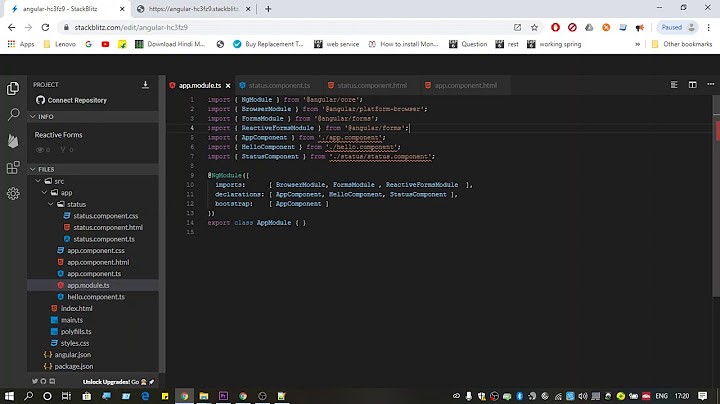Two way binding in reactive forms
Solution 1
Note: as mentioned by @Clouse24, "Using Reactive Froms with ngModel is deprecated in angular 6 and will be removed in a future version of Angular" (which means that the answer below will no longer be supported in the future). Please read the link to see the reasoning for deprecation and to see what alternatives you will have.
You can use [(ngModel)] with Reactive forms.
template
<form [formGroup]="form">
<input name="first" formControlName="first" [(ngModel)]="example.first"/>
<input name="last" formControlName="last" [(ngModel)]="example.last"/>
</form>
component
export class App {
form: FormGroup;
example = { first: "", last: "" };
constructor(builder: FormBuilder) {
this.form = builder.group({
first: "",
last: ""
});
}
}
This will a completely different directive than the one that would be used without the formControlName. With reactive forms, it will be the FormControlNameDirective. Without the formControlName, the NgModel directive would be used.
Solution 2
Sometimes you might need to combine [(ngModel)] with Reactive forms. I could be some inputcontrol that you don't need as a part of the form, but you still need it to be binded to the controller. Then you can use: [(ngModel)]="something" [ngModelOptions]="{standalone: true}"
Solution 3
Here is how you can solve it:
- shortcut --> STACKBLITZ
In order to have the result of two-way-binding
I use local "template variables" and use the same formControl for both fields.
<form [formGroup]="formGroup">
<input #myInput (input)="mySlider.value = myInput.value" type="number" formControlName="twoWayControl">
<mat-slider #mySlider (input)="myInput.value = mySlider.value" formControlName="twoWayControl" min="1" max="100">
</mat-slider>
</form>
When I programmatically want to change the value of the model I use setValue() as others have proclaimed.
setTo33() {
this.formGroup.get('twoWayControl').setValue(33);
}
Solution 4
// Allow two way binding on the [(name)] from the parent component
private nameValue: string;
@Input()
get name() {
return this.nameValue;
}
set name(values) {
this.nameValue = values;
this.nameChange.emit(this.nameValue);
}
@Output() nameChange = new EventEmitter<string>();
ngOnInit() {
// Update local value and notify parent on control value change
this.formControl.valueChanges.forEach(value => this.name = value));
}
ngOnChanges() {
// Update local value on parent change
this.formControl.setValue(this.expression);
}
Solution 5
An Angular 6+ solution...
I too would like reactive form validation while also using two-way data binding. The best solution I've come up with was to hook the form group's valueChanges event with a debounce timer to update the model. Here's an example:
<form [formGroup]="form">
<input class="form-control" type="date" name="myDate" formControlName="myDate">
</form>
public myModel = {
myDate: '2021-01-27'
};
public form = this.builder.group({
myDate: [this.myModel.myDate, [Validators.required]],
});
// Don't update the model with every keypress, instead wait 1s and then update
this.form.valueChanges.pipe(debounceTime(1000)).subscribe((changes) => {
for (let key of Object.keys(changes)) {
this.myModel[key] = values[key];
}
});
To better help copy/pasta I'm going to update the value of all properties of the moodel with the given changes. If you only wanted to update one property with two-way data binding you should use something like:
this.form.get('myDate').valueChanges.pipe(debounceTime(1000)).subscribe((changes) => {
this.myModel.myDate = changes.myDate;
});
Related videos on Youtube
ebakunin
Updated on July 05, 2022Comments
-
ebakunin almost 2 years
Using Angular 2, two-way binding is easy in template-driven forms - you just use the banana box syntax. How would you replicate this behavior in a model-driven form?
For example, here is a standard reactive form. Let's pretend it's much more complicated than it looks, with lots and lots of various inputs and business logic, and therefore more appropriate for a model-driven approach than a template-driven approach.
export class ExampleModel { public name: string; // ... lots of other inputs } @Component({ template: ` <form [formGroup]="form"> <input type="text" formControlName="name"> ... lots of other inputs </form> <h4>Example values: {{example | json}}</h4> ` }) export class ExampleComponent { public form: FormGroup; public example: ExampleModel = new ExampleModel(); constructor(private _fb: FormBuilder) { this.form = this._fb.group({ name: [ this.example.name, Validators.required ] // lots of other inputs }); } this.form.valueChanges.subscribe({ form => { console.info('form values', form); } }); }In the
subscribe()I can apply all sorts of logic to the form values and map them as necessary. However, I don't want to map every input value from the form. I just want to see the values for the entireemployeemodel as it updates, in a approach similar to[(ngModel)]="example.name", and as displayed in the json pipe in the template. How can I accomplish this? -
Zuriel almost 7 yearsasked a similar question in Angular/Angular and two of the core developers told me that mixing ngModel and Reactive forms is a bad idea. You should be able to get the values with {{this.form.get('first').value}}
-
 squadwuschel almost 7 years@Zuriel but how can I bin my local modeldata direct to my form so I've two way databinding for my modeldata? Because without the above solution I need to map my formdata back to my modeldata
squadwuschel almost 7 years@Zuriel but how can I bin my local modeldata direct to my form so I've two way databinding for my modeldata? Because without the above solution I need to map my formdata back to my modeldata -
Zuriel almost 7 yearsangular.io/guide/reactive-forms In keeping with the reactive paradigm, the component preserves the immutability of the data model, treating it as a pure source of original values. Rather than update the data model directly, the component extracts user changes and forwards them to an external component or service, which does something with them (such as saving them) and returns a new data model to the component that reflects the updated model state.
-
Eliseo over 6 yearspeeskillet, you can shoot you to a foot too, but it's no good thing :)
-
 crystalthinker over 6 yearsWithout using ngModel you can access the data as mentioned by @zuriel . Created a plunker. plnkr.co/edit/pPjI4hXI13AfcqOMuVfF?p=preview
crystalthinker over 6 yearsWithout using ngModel you can access the data as mentioned by @zuriel . Created a plunker. plnkr.co/edit/pPjI4hXI13AfcqOMuVfF?p=preview -
 John about 6 yearsI thoguht it was bad practice to use ngModel on reactive forms, maybe I am wrong; but in my use case I found it better since I need to update some UI on the fly.
John about 6 yearsI thoguht it was bad practice to use ngModel on reactive forms, maybe I am wrong; but in my use case I found it better since I need to update some UI on the fly. -
ye-olde-dev almost 6 yearsUsing Reactive Froms with ngModel is deprecated in angular 6 and will be removed in angular 7. angular.io/api/forms/FormControlName#use-with-ngmodel
-
 Sherwin Ablaña Dapito almost 6 yearsThis has been deprecated in Angular v6 and will be remove in Angular v7. You can check this for more details next.angular.io/api/forms/FormControlName#use-with-ngmodel
Sherwin Ablaña Dapito almost 6 yearsThis has been deprecated in Angular v6 and will be remove in Angular v7. You can check this for more details next.angular.io/api/forms/FormControlName#use-with-ngmodel -
Efrain over 5 yearsSo, in a nutshell: Two-way binding does not work with FormBuilder? (i.e. updating the model automatically when the formControl value changes)
-
 Ameerudheen.K almost 5 yearshow to do this if we cant use ngmodel? can anyone help?
Ameerudheen.K almost 5 yearshow to do this if we cant use ngmodel? can anyone help? -
 Rohit Parte over 4 yearsThis works for me! Since Angular 7 reactive forms doesn't support ngModel
Rohit Parte over 4 yearsThis works for me! Since Angular 7 reactive forms doesn't support ngModel -
 Michelangelo over 4 yearsFor Angular devs reading this. I wasn't confused about the ngModel and formControlName! This was super handy actually, making a reactive form and binding a model. What if we could do both in one thing? Something like this:
Michelangelo over 4 yearsFor Angular devs reading this. I wasn't confused about the ngModel and formControlName! This was super handy actually, making a reactive form and binding a model. What if we could do both in one thing? Something like this:formGroup = new FormGroup({ name: new FormControl(['Michelangelo', {modelBinding: true}]) })So we can actually bind it to a model and not manually update it. -
 possum_pendulum over 4 yearsAnyone know the official way to implement two-way binding in reactive forms that will be safe in Angular 7?
possum_pendulum over 4 yearsAnyone know the official way to implement two-way binding in reactive forms that will be safe in Angular 7? -
Newclique about 4 yearsYou need to consider that the creators of Angular, other than obviously being talented developers, have a very good reason for why the Reactive Forms are designed the way they are. It is a paradigm shift away from legacy binding. Only when the form data itself is perfect should the user then, during submission to the data store, bind the values from the form to the data model. This is a pure separation of concerns, the 'S' in SOLID. Use Object.assign(dataModel, formGroup.value) to transcode the form values to the data model. Extend a view model from each data model to add view-only fields.
-
N8allan about 4 yearsI'm happy to report that this is working in Angular 9. I'm hoping they've changed their mind and will keep this.
-
 JWP over 3 yearsTo clarify, this technique is a pure binding to the FormControl itself, and not to the model.
JWP over 3 yearsTo clarify, this technique is a pure binding to the FormControl itself, and not to the model. -
Shadoweb over 3 years@N8allan no, it's still deprecated, look at your console.
It looks like you're using ngModel on the same form field as formControlName. Support for using the ngModel input property and ngModelChange event with reactive form directives has been deprecated in Angular v6 and will be removed in a future version of Angular. -
N8allan over 3 years@Shadoweb, that's what it says, but I think they should reconsider. There are cases where binding isn't being used to support the form, and taking away this ability would lead to unnecessarily circumlocution. Restrictions like this are what you'd call unorthogonal, and they make frameworks and languages inelegant and cumbersome.
-
 BeniaminoBaggins over 2 yearsI really like this. I'm just wondering why updating the model is not automatic like in template driven forms? It almost seems like they don't want us not to do this or it would happen by default. And they often point us towards Reactive Forms as a best practice not Template driven forms, reinforcing that they don't want us to do this. Plus removing the
BeniaminoBaggins over 2 yearsI really like this. I'm just wondering why updating the model is not automatic like in template driven forms? It almost seems like they don't want us not to do this or it would happen by default. And they often point us towards Reactive Forms as a best practice not Template driven forms, reinforcing that they don't want us to do this. Plus removing thengModelfrom Reactive Forms. I read the deprecation document, which said it is because it is confusing. But it seems so much more convenient to me.






![Two Way Data Binding in Angular | [(ngModel)] | Angular 6 Tutorial in Hindi(2019) [#10]](https://i.ytimg.com/vi/Q3v9m1wHgTo/hq720.jpg?sqp=-oaymwEXCNAFEJQDSFryq4qpAwkIARUAAIhCGAE=&rs=AOn4CLBqFVbWkDW_UXIIX2btszXzO3MRCw)

